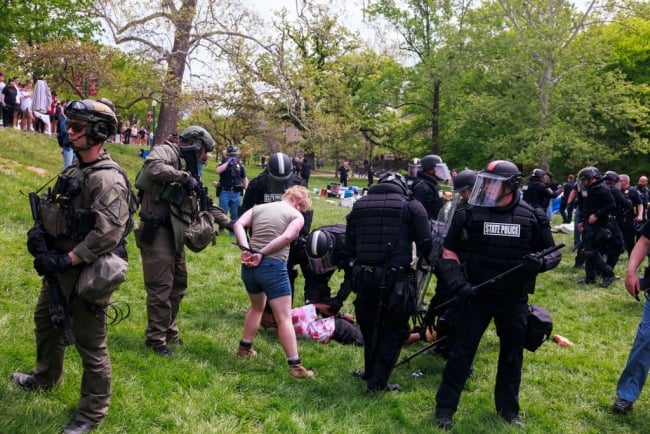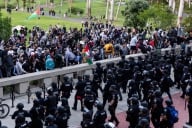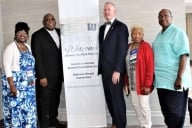You have /5 articles left.
Sign up for a free account or log in.

Indiana University at Bloomington is one of many institutions facing a lawsuit over its handling of recent campus protests that culminated in the arrests and suspensions of allegedly peaceful protesters.
Photo by Jeremy Hogan/SOPA Images/LightRocket via Getty Images
Campus battles over building takeovers and student encampments related to protests over the Israel-Hamas war have led to a wave of litigation against colleges across the country.
Many of those institutions are now facing lawsuits for alleged unlawful treatment of protesters, including suspensions, expulsions and arrests.
Lawsuits from suspended pro-Palestinian protesters, such as those at Arizona State and Indiana Universities, say certain institutions violated aspects of their First Amendment rights in barring them from campus during allegedly peaceful protests. Meanwhile, Jewish students, such as those at the University of Californi, Los Angeles, Northwestern and Rutgers Universities, allege in legal filings that their universities didn’t protect them from antisemitic harassment amid the protests.
And unionized campus workers have filed unfair labor practice charges with the National Labor Relations Board (NLRB) against institutions such as Harvard and Brown Universities, arguing that crackdowns on pro-Palestinian protesters violated workers’ rights.
The onslaught of litigation doesn’t surprise higher education and legal experts, who spent the better part of this academic year observing how university administrators struggled to balance campus safety with free speech protections in the face of mounting public criticism and political interference by state and federal lawmakers.
‘Just a Matter of Time’
“The thing a university does to protect a class of students is exactly the thing that’s going to trigger a lawsuit that claims free speech rights have been violated,” said Peter Lake, a law professor and director of the Center for Excellence in Higher Education Law and Policy at Stetson University College of Law. “As soon as the protests erupted last October, I knew lawsuits were coming. It was just a matter of time before this turned into a very complex set of litigation issues.”
Although the outcome of each individual case will hinge on the specific evidence that comes out of the legal discovery process, the litigation is fueling an ever-evolving debate about the limits of free speech. And court decisions may give university administrators more concrete guidance in an era of inconsistent messaging by lawmakers and activists about what constitutes free speech and who has a right to express it on a college campus.
“With many of these claims flying around, I think we’re going to see exactly where higher ed landed in terms of its new relationship with speech and the protection of protected classes on campus,” Lake said. “In some ways, it’s going to be a test of the new free speech intervention policies that a lot of campuses developed after Charlottesville.”
August marks seven years since a group of white nationalists, led by neo-Nazi Richard Spencer, marched through the University of Virginia’s grounds carrying torches and shouting “Jews will not replace us,” during a rally that led to a counterprotester’s death off-campus. Spencer and other like-minded white nationalists had also made appearances on numerous other campuses before and after the violence in Charlottesville.
Despite objections by students and faculty members arguing that the presence of such speakers threatened campus safety, broad campus free speech policies in place at the time allowed the events to move forward. But the controversy over the presence of the neo-Nazi groups and the related violence also prompted UVA and many other universities to later add more restrictions to their policies on outside speakers and campus rallies.
And that was what the majority of college students in the late 2010s wanted.
According to a 2018 survey from the Foundation for Individual Rights and Expression (FIRE), 60 percent of the 2,225 student respondents said that promoting an inclusive environment “that is welcoming to a diverse group of students should be a more important priority than protecting students’ free speech rights, including hurtful or offensive speech.”
FIRE characterized that belief as “troubling,” and said it suggested “only a surface-level understanding of free expression and association protections that underlie the First Amendment.”
Six years later, the protest-related lawsuits some students have filed against their universities are exposing the challenges of making clear distinctions between protected and offensive speech.
‘Countervailing Pressures’
“A lot of universities took the initial approach of being fairly tolerant of this just like they have in other protest events,” said Keith Whittington, a free speech expert and politics professor at Princeton University. “But precisely because this is the kind of protest that doesn’t unify the campus—and certainly some Jewish students felt like the protests were directed toward them—that put a whole set of countervailing pressures on universities to begin to not treat this as if it were just another demonstration on campus.”
Despite the U.S. Supreme Court’s historically broad interpretation of protected speech, which makes no exception for so-called hate speech, administrators have also had to manage the Israel-Gaza war protests against a backdrop of intense outside political pressure on universities to curb campus antisemitism and crack down on pro-Palestinian protesters.
Numerous universities responded to protests over the past few months by calling in the police and punishing protesters who refused to disperse. And while private universities aren’t required to uphold the First Amendment, public universities are.
“If students allege they are being disciplined for actions they undertook that were consistent with their First Amendment rights, they absolutely can get a court to intervene to set aside that discipline,” Whittington said. “It’s also possible that they admit they violated a university’s rules, but that the rules themselves are inconsistent with First Amendment requirements. That also would be sufficient to get potential judicial intervention.”
Although the plausibility of those claims depends on protesters’ specific actions, Stevie Pactor, a lawyer for the ACLU of Indiana, believes a federal lawsuit the ACLU filed against Indiana University at Bloomington, after police arrested more than 50 protesters last month, makes a strong case.
In addition to the arrests, IU administrators also barred many of those students from the campus for a year, which meant that they wouldn’t be permitted to return to a designated free-speech zone on campus and participate in future, peaceful protests. The suit, which was filed on behalf of three of those banned protesters, argues that IU’s no-trespass orders violated First Amendment protections against prior restraint.
“It’s an order prohibiting speech before it occurs,” Pactor said. “It’s very well-established that the government has to reach a very high threshold to show that a restriction on speech before it occurs is justified.”
According to Pactor, the IU protesters were “singing” and “doing art” when they were arrested, but the prior restraint clause even protects the future speech of a person with a history of disorderly conduct. That message may become more clear for higher education administrators depending on the outcome of the case against IU and other public universities.
“One reaction that seems common among lots of these universities facing these issues is overreaction. The first impulse is ‘We have to make sure the things that are happening at Columbia don’t happen here. Shut it all down,’” she said. “Decisions in cases like this are really important to push back on [the] general trend of overreaction … especially on college campus.”
After police arrested more than 70 people at a pro-Palestinian encampment at Arizona State last month—many were also later barred from campus—a lawsuit was filed against ASU, alleging that the university violated the First Amendment when it retaliated against the protesters “based solely upon the anti-Israel message being communicated by Plaintiffs’ protest.”
The complaint describes how members of a fraternity stood nearby “partying, drinking, and videoing the events of the protests when Plaintiffs were arrested” and says that Arizona State’s choice to arrest and discipline the protesters instead of the bystanders, demonstrated “the targeted nature of ASU’s actions.”
Although the suit alleges the Arizona State protesters weren’t disruptive, ASU officials have said that encampments weren’t permitted on campus and that the protesters violated various aspects of the student conduct code, according to The Arizona Republic.
Zach Greenberg, senior program officer of campus rights advocacy at FIRE, said that if the evidence that comes out during litigation supports the protesters’ claims, it “would seem to be a pretty clear free speech violation.”
While most lawsuits settle out of court, he said that after the hardline approach so many universities took toward protesters, he’s expecting to see more litigation as the summer wears on.
“With the lawsuits combined with congressional pressure combined with donor pressure, I think we’re going to see some meaningful changes as universities review their policies,” Greenberg said. “I imagine it’s going to be a very reflective summer for a lot of universities.”
But pro-Palestinian activists aren’t the only ones who felt unfairly targeted during the protests.
‘Slippery Slope’
Jewish students at the University of California, Los Angeles, Northwestern and Rutgers Universities, and elsewhere have also sued their institutions, making various legal arguments that the protests enabled antisemitic harassment on campus. (The presidents of all three of those universities are also expected to testify before the U.S. Committee on Education and the Workforce Thursday about campus responses to antisemitism.)
The suit against Northwestern (which eventually reached an agreement to end the protest encampments) alleges that the private university breached its contract that gives all students the opportunity “to learn and thrive, and protections against abuse, harassment, intimidation, and discrimination,” when it allowed protesters to ask Jewish students if they spoke Hebrew, post a sign depicting Northwestern’s Jewish president, Michael Schill, as a “bloodthirsty devil" and chant or write on posters the phrase “From the river to the sea,” which some supporters of Israel perceive to be a call for its elimination.
But shutting down the protests over those words and actions, “would be a slippery slope because Northwestern also promises students free speech,” Greenberg said. “It would set a bad precedent if the university could be punished for trying to uphold free speech rights.”
Protest-related litigation is also tying into the push for collective bargaining that’s gained a foothold in higher education in recent years.
While private universities aren’t beholden to the First Amendment, their unionized workers may have alternative legal recourse. In recent labor violation complaints filed with the NLRB, student-workers at institutions including Brown and the University of Southern California say the arrests of pro-Palestinian protesters infringed on their right to organize.
However, workers at private universities aren’t the only ones invoking labor violations in criticizing institutional responses to the protests.
Last week, unionized academic workers within the 10-campus University of California system voted for “rolling strikes” in response to officials’ “alleged unfair labor practices against union members who supported pro-Palestinian student protests demanding that universities divest from Israel and weapons companies,” The Los Angeles Times reported.
On Monday, graduate students at the University of California, Santa Cruz were the first to go on strike.
“This may be one of the first instances beyond just things like wages and benefits of items that may be in a collective bargaining agreement that may be important for speech rights on campus,” said Neal Hutchens, a free speech expert and professor of educational policy at the University of Kentucky. “That’s pretty new and novel.”
While all of these lawsuits will take time to resolve, the fallout from the protests “is one more piece of fodder to try to argue that colleges and universities can’t govern themselves,“ Hutchens said. “I don’t know to what extent the litigation, specifically, will propel that, but it’s definitely going to keep it in the public eye and get the attention of donors and elected officials.”








